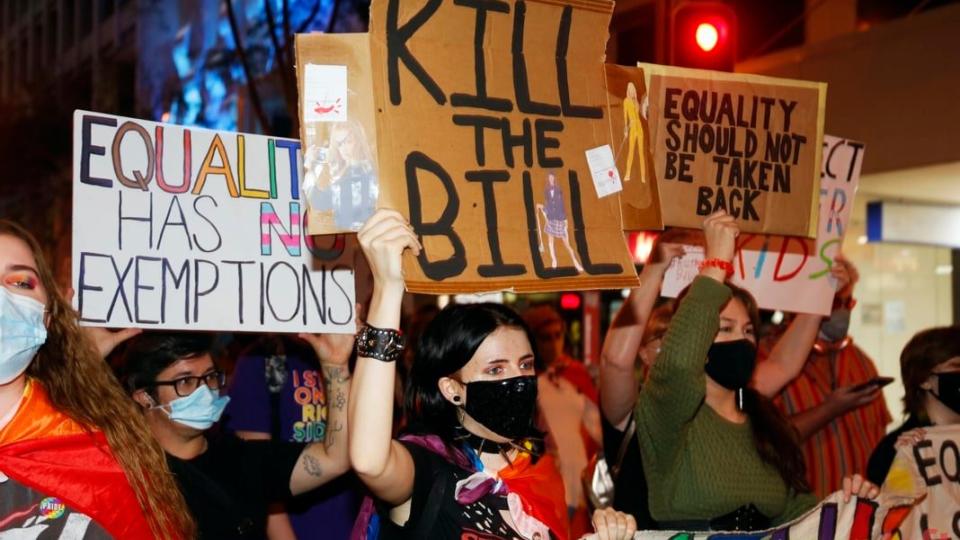Religious bigotry bill defeated, no thanks to Labor

The trans and rainbow community celebrated a victory when the Religious Discrimination Bill was withdrawn on February 10.
The bill purported to defend people against discrimination based on their religious beliefs. However, its real aim was to mount a political counterattack against the successful marriage equality campaign.
Its main function was to arm right-wing bosses with an enhanced “sword” to discriminate against workers and students in faith-based schools and other organisations.
The recent attempt by Citipointe Christian College in Brisbane to force parents to sign an enrolment form describing homosexuality and free gender expression as “sins”, alongside bestiality, incest and paedophilia, shows just how much was at stake.
Scott Morrison also wanted a political “wedge” to trap Labor in the context of plummeting support for him and the Coalition.
His plan backfired when the Senate decided not to debate the amended bill, which five Liberals crossed the floor to support. Morrison withdrew the bill after the Australian Christian Lobby (ACL) announced it was no longer fit for purpose. ACL declared the amended bill had been “completely undermined” as the right to discriminate against trans students had been removed.
The Labor Party is claiming responsibility for putting the bill onto the back burner. It claims its tactic of speaking against the bill and moving amendments worked.
Given that Opposition leader Anthony Albanese had promised, in advance, that Labor would vote for the bill even if its amendments didn’t get up, this claim does not stack up. It was independent MP Rebekha Sharkie’s amendment to abolish the right of religious schools to discriminate against gay and transgender students that received support.
The Public Interest Advocacy Centre (PIAC), the Greens, the Law Council of Australia and the LGBTIQ community, among others, mounted a last-ditch campaign calling on Labor to reject the bill. The Uniting Church, the NSW Buddhist Council and the Australian Federation of Disability Associations called for the same.
Jonathan Hunyor of PIAC described the bill as “vandalism of our federal discrimination framework”. He said the “statements of belief” provisions would have meant “women, LGBTI people, people with disability, single parents and even people of minority faiths [would] be exposed to derogatory comments as they go about their daily lives, in workplaces, in education, in health care, in public transport, in shops, cafes and restaurants”.
The question remains: why is Labor giving any support to religious discrimination?
Labor apologists argue that the party could not risk losing support from “faith communities” who support a religious discrimination bill. But supporting a religious discrimination bill completely ignores the reactionary context in which this bill was proposed and developed. Accommodating this conservative pressure can only strengthen the political right.
Large majorities had already opposed the key elements of the bill. The Guardian reported on February 3 that 77% of voters oppose the “statements of belief” clause and 64% said it should be against the law for religious schools to expel gay and trans students. Similar numbers opposed the ability of schools to sack gay and trans teachers.
This reservoir of support for LGBTIQ students and teachers is an important legacy of the marriage equality campaign, which was actively waged for more than a decade. It decisively shifted public opinion in favour of LGBTIQ rights.
This is the reason Liberal MPs decided to cross the floor, not Labor’s parliamentary games. Indeed, Labor refused to support Sharkie’s amendment to remove the right of religious organisations to discriminate against staff and students in schools. Three moderate Liberals “came over for the repeal of the whole of section 38 [of the Sex Discrimination Act], to protect teachers and students, but that failed because Labor didn’t support it,” Sharkie told the Saturday Paper. Labor only supported removing section 38 (3), which applies to students, not staff.
Further, shadow home affairs minister Kristina Keneally said Labor would bring in its own Religious Discrimination Bill if it wins government this year. On Insiders on February 13, she refused to rule out allowing schools to sack gay and trans staff.
Labor has a long record of capitulating to Coalition wedge tactics, including on refugee rights (2001), same-sex marriage rights (2004), the Northern Territory “Intervention” (2007) and Morrison’s tax cuts for the rich (2016), to name just a few examples.
This record makes it difficult to accept Labor’s line that its support for the Religious Discrimination Bill was, primarily, about tactics.
Progressive politics is about building support for progressive ideas, not parliamentary manoeuvres that give political space to conservatives and reactionaries to compromise hard-won rights.
[Alex Bainbridge and Rachel Evans are active in the LGBTIQ rights movement and are members of the Socialist Alliance National Executive. Evans is running for Socialist Alliance in the NSW Senate.]